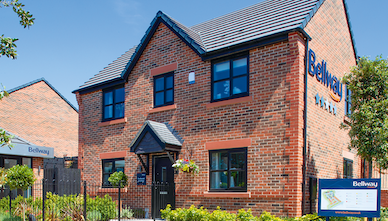Newcastle-based house building giant Bellway said its revenue rose 3.5% to £1.78 billion and profit before tax climbed 9.8% to £307.6 million in the half year ended January 31, 2022.
Bellway said its interim dividend has been increased 28.6% to 45p per share.
The Newcastle firm said it has an order book comprising 7,491 homes and a value of £2.2 billion.
“The forward visibility provided by the order book means that the average selling price is now expected to be over £305,000 for the full financial year (31 July 2021 – £306,479, 31 July 2020 – £293,054), a further improvement compared to previous guidance, driven by mix and pricing benefits …” said Bellway.
“Our substantial order book, strong land bank, and significant balance sheet capacity supports our growth strategy and medium-term target to deliver annual output of around 12,200 homes in financial year 2023.”
Richard Hunter, head of markets at interactive investor, said: “Following an aggressive land acquisition programme which positions the company for strong future growth, Bellway has delivered an update which ticks all the boxes on the key metrics.
“Net cash has decreased slightly over the period given the company’s general buying activity, while the spectre of cost inflation has largely been offset by rising house prices.
“Its volume output is ahead of not only last year but also pre-pandemic levels, while there are also improvements to its reservation rate, which is up 5.8% and its underlying operating margin, which has improved from 17.3% to 18.7%.
“Bellway’s confidence for its prospects is amply demonstrated by a rise of 29% to the interim dividend, which implies a yield of 4.9%, a clear invitation to income-seekers in the current environment.
“This has been underpinned by a revenue rise of 3.5% and a pre-tax profit hike of 9.8%, with the outlook remaining equally upbeat.
“The forward sales order book is ahead by 24% (and by 30% against pre-pandemic comparisons), with volume growth of around 10% and stable operating margin likely to be maintained.
“Unfortunately, and with the sector as a whole, the bears have been in the driving seat.
“Cost inflation, pressure on household incomes, rising interest rates and supply chain constraints have all clouded prospects, and Bellway is no exception.
“Over the last year, the share price has declined by 25%, as compared to a dip of just 1.7% for the wider FTSE250 index.
“Even so, and with some of the larger players in the industry, the general view of the company’s prospects is optimistic, with the market consensus of the shares continuing to come in at a strong buy.”
AJ Bell investment director Russ Mould said: “It’s difficult not to view the UK housing market as the man who fell from a tall building saying ‘so far so good’ on the way down as it continues to defy gravity.
“This is reflected in the latest set of numbers from house builder Bellway as it hiked guidance for average selling prices above £300,000.
“Pent-up demand from the pandemic and appetite for larger homes, as more people spend at least part of their working week at home, are apparently still live factors when it comes to property purchases.
“At some point the momentum in house prices will run up against a brick wall of cost-of-living pressures and rising interest rates.
“The markets certainly seems to think so judging by a Bellway share price which is down more than 20% in 2022.
“This shift in market conditions will represent a direct reversal of the trend over the last decade when the sector benefited from wide availability of cheap mortgages and state support through the Help to Buy scheme.
“What hasn’t gone away are tight supply and demand dynamics and at least the housebuilders have taken the opportunity to fix the roof while the sun is shining.
“Most have strong balance sheets and Bellway is no exception with net cash of nearly £200 million.
“This may also support the ability to pay dividends to reward investors for their patience during any future market downturn.
“Bellway’s increased investment in land in the last year-and-a-half, often at advantageous prices, is also supporting strong returns and cash generation even against a backdrop of supply shortages and inflationary pressures.”
